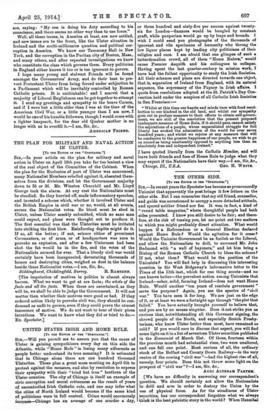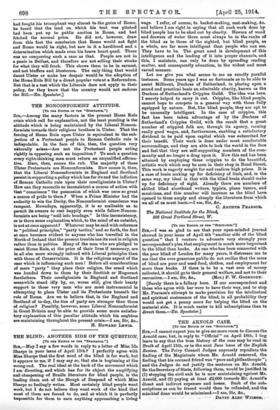THE OTHER SIDE.
[To no: Romig OF vim "Ersorwroa."] SIR,—In recent years the Spectator has become so pronouncedly Unionist that apparently the post brings it few letters on the other side. But I can remember that my old friend, counsellor, and guide was accustomed to occupy a more detached attitude, and spared neither friend nor foe. It was, in fact, a kind of "round table magazine," where thoughtful people had both sides presented. 1 know you still desire to be fair; and there- fore, at the risk of teasing you, let me point out two matters to which you might profitably direct attention. What would happen if a Referendum or a General Election declared against Home Rule P Would the agitation for it cease P Would the Unionist Government be as foolish as the Liberal, and allow the Nationalists to drill, to surround Mr. John Redmond with "a wall of bayonets," and let him bring a Bishop of the Roman Catholic Church to bless the colours P If not, what then? What would be the position of the Unionists P You will find help in discussing this interesting question in Sir West Ridgeway's informative letter to the Times of the 11th inst., which for one thing scouts—and no one knows better—the prevalent notion among Unionists that Ireland—sober, solid, farming Ireland—does not want Home Rule. Would another "ten years of resolute government' serve the purpose P Again, you see the spectre of "civil war." You have seen it for long. We are just on the edge of it, or at least we were a fortnight ago through "the plot that failed." You have actually brought yourself to believe that, and you are by no means singular. Does it not strike you as curious that, notwithstanding all this Covenant signing, the shrewd people of the North, and especially Scotch Presby- terians, who know Ulster better than most, have remained so cold P If you would care to discuss that aspect, you will find some light on it in a list of seventeen Ulster securities published in the Economist of March 21st. Of these, fourteen within the previous month had substantial rises, two were unaltered, and one fell one point. Most curious of all, the ordinary stock of the Belfast and County Down Railway—in the very centre of the coming "civil war "—had the highest rise of all, namely, four points. Does this not throw some light on the prospect of "civil war "P—I am, Sir, Ac.,
AUDI ALTBELN PARTIN.
[We have no difficulty in answering our correspondent's question. We should certainly not allow the Nationalists to drill and arm in order to destroy the Union by the use of physical force. As for the steadiness of Ulster securities, has our correspondent forgotten what we always think is the beat patriotic story in the world P When Hannibal had fought his triumphant way almost to the.gates of Rome, he heard that the land on which his tent was pitched bad been put up to public auction in Rome, and had fetched the normal price. He did not, however, draw from this fact the conclusion that Rome would not fight and Rome would be right, but saw in it a hardihood and a determination which made even his brave heart quail. There was no conquering such a race as that. People are not in a panic in Belfast, and therefore are not selling their stocks for what they will fetch. This shows them to be in earnest, and not bluffers and blusterer°. The only thing that would daunt Ulster or make her despair would be the adoption of the Home Rule Bill by a direct popular vote at a Referendum. But that is a teat which the Liberals dare not apply to their policy, for they know that the country would not endorse the Bill.—En. Spectator.]



























































 Previous page
Previous page